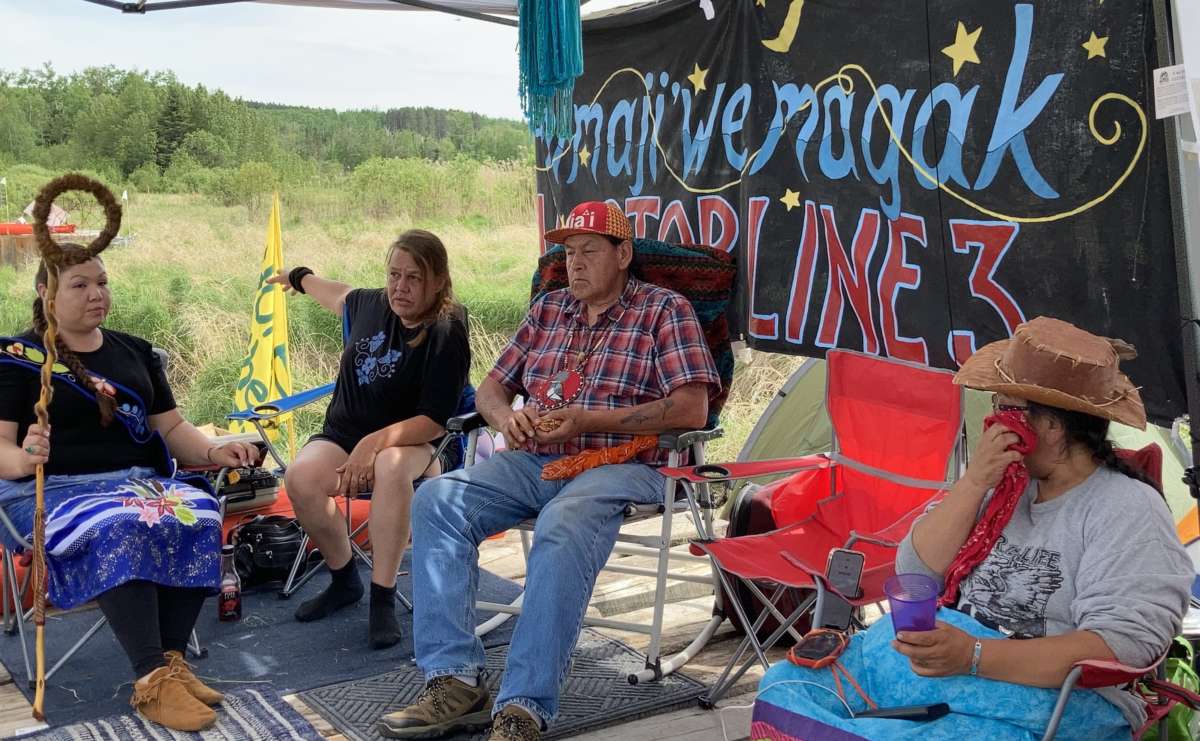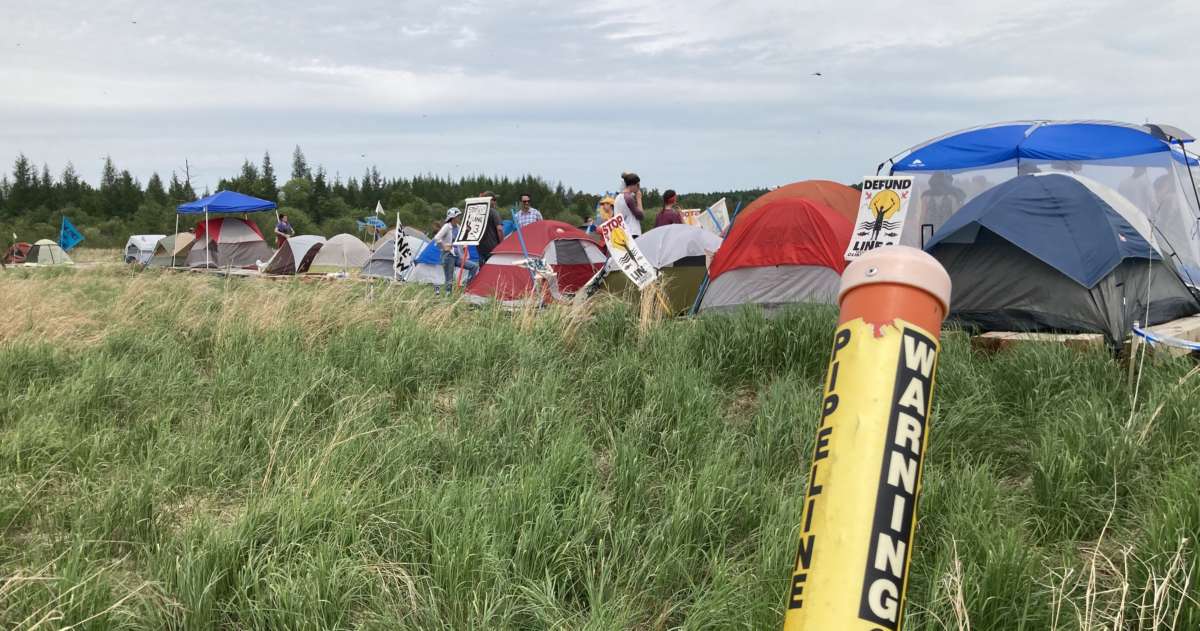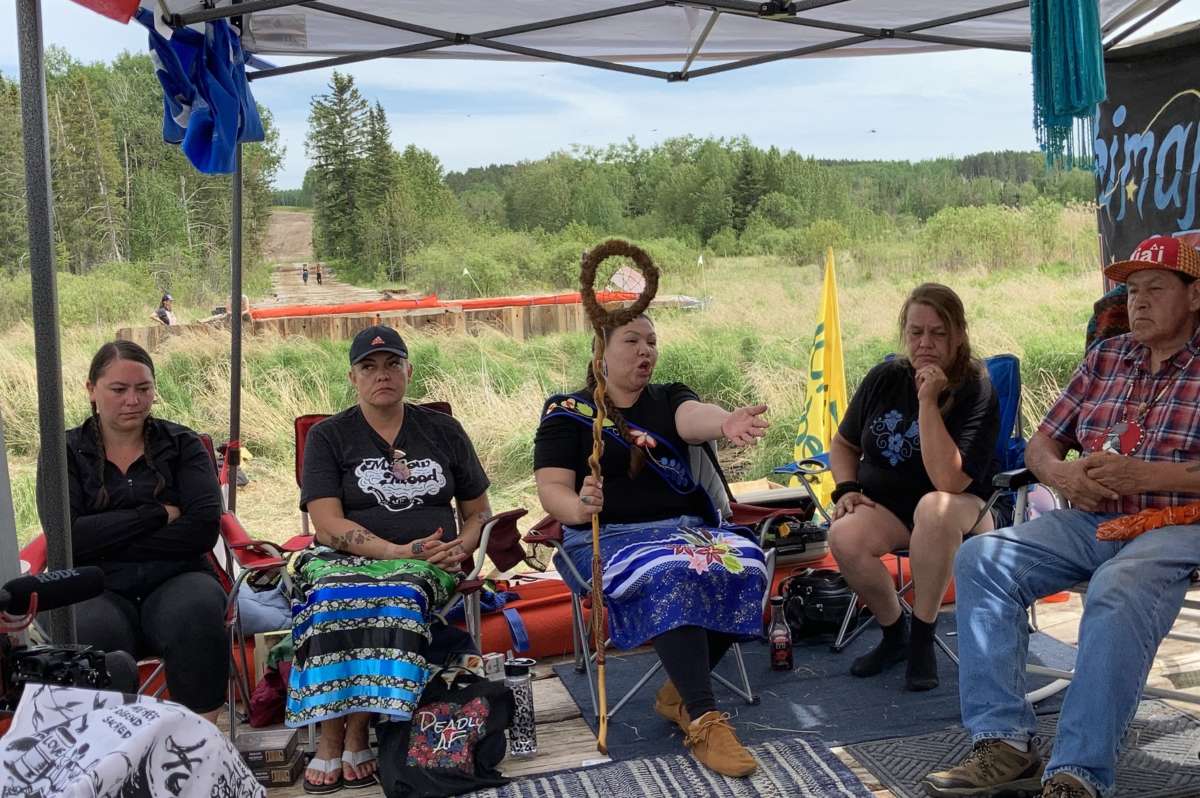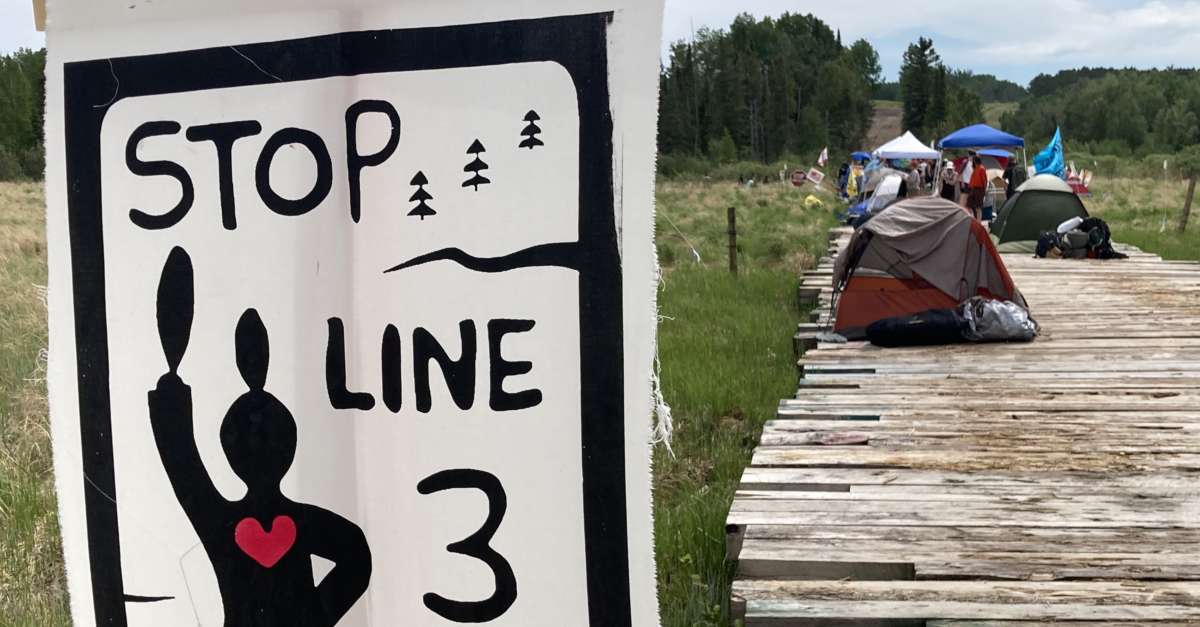After a brutal crackdown in which police with the 16-county Northern Lights Task Force arrested more than 200 Water Protectors opposing the Line 3 pipeline at the Two Inlets pump station north of Park Rapids, Minnesota, Indigenous leaders are now settling in for a long-haul occupation at a pipeline easement site at the headwaters of the Mississippi River in Clearwater County.
On Monday, 24 Water Protectors were arrested after locking themselves to construction machinery at the pump station. Another 24 locked themselves to a boat blockading the access road overnight, with arrests still happening into Tuesday afternoon. Sheriffs funded by Alberta, Canada-based Enbridge Energy through a public safety escrow account, deployed a low-flying Department of Homeland Security (DHS) helicopter against Water Protectors, blasting them with dirt and rocks. They also blared a sound weapon called a Long Range Acoustic Device without warning.
This week’s mass direct actions follow the weekend-long Treaty People Gathering, which drew more than 1,500 people to northern Minnesota to fight the 337-mile, $4 billion tar sands pipeline. Escalating law enforcement tactics this week display more than a year’s worth of training and preparations.
Northern Lights Task Force officials alleged Monday that the DHS helicopter was deployed in order to announce a dispersal order, not as the means of a dispersal attempt. If the claim is true, the announcement proved inaudible to most Water Protectors on the ground. Even if they had heard the announcement, they have good reason to be skeptical of the Task Force’s claim: According to records obtained by The Intercept, the task force “carried out extensive preparations for helicopter and drone operations in the year leading up to construction via a subcommittee dedicated specifically to air operations.”
Simultaneously on Monday, 1,500 people marched toward a pipeline easement site where Enbridge plans to drill under Mississippi River headwaters. About 200 people walked onto the site and launched an ongoing treaty encampment, camping out in about 100 tents overnight. Indigenous Water Protectors with the RISE Coalition are leading the occupation, joined by tribal relatives from across the continent.
“We are going to stay here and protect our natural elements,” said RISE Coalition Co-Founder Nancy Beaulieu of the Leech Lake Band of Ojibwe during a press conference at the occupation site. “We need more people to come. We have a right to occupy. This is [1855 Treaty territory], so even non-Native people that are down here, they are our guests and they have a right to be here, and they are honoring those treaties by holding space with us today.”

The new encampment asserts Anishinaabe treaty rights under the 1854 and 1855 Treaties, which guarantee tribal access to ceded lands in order to hunt, fish and gather, including rights to do so off reservation. As Truthout reported extensively Tuesday, several tribes have established Indigenous-led pipeline resistance camps in northern Minnesota and are asserting Treaty Authority codes to exercise off-reservation jurisdiction over violations like trespass and to defend the rights of sacred wild rice, or “Manoomin” in the Ojibwe language.
“We need more people to come. We have a right to occupy. This is [1855 Treaty territory].”
“Those treaties are very much alive today as the day they were signed, and they’re legal and binding,” Beaulieu said. “We feel it’s [settler-descended people’s] responsibility to uphold those treaties and stand as a friendly neighbor in peace…. There’s that misconception that [settlers] gave us some land, gave us the right to hunt, travel and gather and fish, when in reality we gave those rights to [settlers], because there’s a lack of truth in America and your history books. We have become the forgotten people, and not one treaty has been honored.”
In sharp contrast to this week’s crackdown on the separate action sites at the Two Inlets pump station, police are so far remaining much more restrained in their response to the new treaty encampment at the pipeline easement site in Clearwater County — one of the few counties that hasn’t accepted Enbridge funding even while being a part of the Northern Lights Task Force, according to RISE Coalition’s Beaulieu.

She said that Clearwater County Sheriff Darin Halverson is taking heat from Enbridge, Task Force officials, and conservative locals for his restraint in allowing hundreds of Water Protectors to cross the wetlands and seize the site Monday after a massive march and sacred water ceremony at the headwaters of the Mississippi River.
The encampment has established itself along a wooden boardwalk that Enbridge workers built to access the construction site from the highway as the company prepares a drill pad to bore underneath the river. Police have yet to move in on the camp to make arrests, and they weren’t immediately present onsite Tuesday afternoon as Water Protectors and allies established a loading zone and brought in supplies to the site, passing water, food and camping gear over a locked gate. A security vehicle stood watch a few miles away on County Road 9, however.
“It’s not a crime to protect our inherent treaty rights, to be a protector of water, of all those sacred elements; it’s a crime to be in collusion with a foreign company.”
Meanwhile, organizers providing jail support say northern Minnesota jails are abusing Indigenous activists and allies and denying their rights in lockup. Some Water Protectors arrested at the Two Inlets pump station were held for more than 20 hours without being booked and were denied prescription medications. People injured during their arrest were also being denied medical attention despite pleading for aid, they say, as well as their constitutional right to speak to an attorney. Organizers tell Truthout most of the arrestees have been transferred to other counties, with 161 people released so far.
The Intercept reports that, as of the end of May, Enbridge has reimbursed $1,086,361 to agencies and organizations responding to pipeline protests and other public safety issues — including, as Truthout has reported, domestic violence shelters housing survivors who say they were sexually assaulted by Line 3 pipeline workers.
The majority of the funds have gone to local sheriffs’ offices. The Beltrami County Sheriff’s Office, which helped police mass actions earlier this month, is among the top law enforcement agencies reimbursed by Enbridge for “field force” training, gas masks, protective suits, baton stops, security holsters, a megaphone and other gear to “ensure weapon retention for Public Safety Line 3 responses.”

RISE Coalition’s Beaulieu called out the county for taking Enbridge’s money at the Mississippi treaty encampment, saying Beltrami County has been dependent on the economic support of the White Earth, Red Lake and Leech Lake tribes, which all oppose Line 3.
“It’s sad to know that all they want is our money. This is not how you treat a neighboring tribal nation,” she said. “It’s not a crime to protect our inherent treaty rights, to be a protector of water, of all those sacred elements; it’s a crime to be in collusion with a foreign company that couldn’t care less if they poison our water. That’s not being a friendly neighbor.”
“We’re showing this colonial world that we have a sacred promise.”
She also pointed out that 13 area counties are being held economically hostage by Enbridge after the state of Minnesota overtaxed the company for land seized along the pipeline route, leaving some of the smaller counties on the hook for refunds that eclipse their annual tax levies — and thus, dependent on the Enbridge escrow fund.
President Joe Biden is coming under increasing pressure to take a position on pipeline as Indigenous Water Protectors ramp up direct action and as another Alberta-based company, TC Energy, announced Wednesday its termination of its Keystone XL pipeline.
Like Keystone XL, Line 3, if built, would also cross an international border and hundreds of water bodies while locking in dangerous, planet-warming pollution. As Truthout has previously reported, “Indigenous and environmental activists in Minnesota have been fighting Line 3 for nearly as long as activists have been fighting Keystone XL,” and call the Line 3 a “Keystone clone,” because it’s also an expansion project that would also carry tar sands crude from Alberta, Canada, to mostly export markets. Both pipeline routes abut tribal reservations. Line 3, however, cuts directly across tribal treaty lands and the Fond du Lac Indian Reservation. (The Fond du Lac Band of Lake Superior Chippewa agreed to allow Enbridge to build the pipeline in 2018.)

“This is all [Canadian Prime Minister Justin] Trudeau oil. He was supposed to be a hero for the climate. He was supposed to be some kind of hero for truth and reconciliation for our people because our tribe is on that side of what they call that fictitious border in Canada, but he’s just another politician with a pretty face sending out those colonial mistruths and lies,” said Paul Wagner of Saanich First Nation at the Mississippi River treaty encampment. “We’re showing this colonial world that we have a sacred promise…. and we’re going to show all those non-Indigenous treaty people that maybe you need to adopt the sacred promise too for the circle of life.”
As food and bathroom stations were being set up along the boardwalk for the long haul, Water Protectors were making it clear this week of their commitment to that promise. “We come today and will stay as long as we are physically able,” said Mary Crowe of the Eastern Band of Cherokee Indians. “Our babies are here with us…. We’re home here.”
Media that fights fascism
Truthout is funded almost entirely by readers — that’s why we can speak truth to power and cut against the mainstream narrative. But independent journalists at Truthout face mounting political repression under Trump.
We rely on your support to survive McCarthyist censorship. Please make a tax-deductible one-time or monthly donation.
